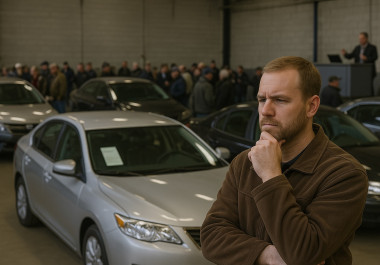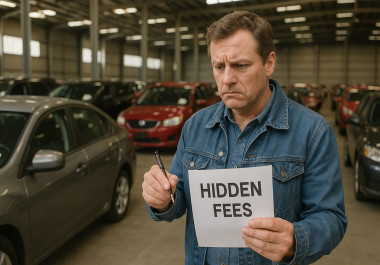There are few experiences more frustrating than getting into your car, turning the key, and having absolutely nothing happen. There’s no good time for your car to die on you, but it’s particularly irritating if you’re already some distance from home. Mercifully, sometimes the issues are relatively straightforward, and if you’ve got the right tools and equipment at home, you may even be able to fix it yourself – especially if you’ve got a couple of spare parts from the salvage cars in our online vehicle auctions.
When it comes to these sorts of situations, forewarned is forearmed – so here are a couple of the most likely major issues why your car won’t start.
Dead battery
A dead or drained battery is one of the most frequent reasons a car won’t start, especially if the vehicle hasn’t been driven recently or has been exposed to cold weather. Batteries lose their charge over time, particularly if they’re old, and can drain if you accidentally leave the lights on, use accessories while the engine is off, or don’t drive regularly.
One of the first signs of a dead battery is a clicking sound when you turn the key or push the start button, but no engine turnover. You might also notice dimmed dashboard lights or no lights at all. A quick way to confirm this issue is by using a multimeter to check the battery’s voltage. A reading below 12 volts usually indicates it’s drained.
In most cases, a jump-start can bring the battery back to life temporarily, giving you enough time to get to a garage for further assessment. However, you’re finding that the battery repeatedly dies, it may be time for a replacement – they tend to last an average of three to four years. You can sidestep most future battery issues by making sure your battery is regularly tested, avoiding using accessories while the car isn’t running, and keeping an eye out for corrosion around the battery terminals.
Faulty starter motor
The starter motor is – as you’ve guessed – the component that starts your engine. When it fails, you’ll often hear a distinct clicking sound, or in some cases, there might be no sound at all when you attempt to start the car. Somewhat annoyingly, this can sometimes be misleading, as it might seem similar to a dead battery problem.
However, if the battery is fine and you still can’t get the car started, the starter motor may well be the culprit. Over time, the starter motor wears down, especially if it’s been used frequently or has been exposed to heat or water damage. When it fails, the engine won’t turn over, even if the battery is fully charged.
In some cases, gently tapping the starter motor while someone turns the key might jolt it back into working temporarily, but this is only a temporary fix. (And to be honest, it’s really one to avoid if you’re not professionally trained with engines.) Replacing the starter motor is typically the best solution for a long-term fix.
Fuel system issues
Sometimes the issue with starting a car lies within the fuel system. Surprisingly, an empty or nearly empty tank is a common reason why cars won’t start – it’s not unusual for drivers to underestimate how much fuel is left, especially if they don’t rely on the fuel gauge. If the fuel gauge isn’t accurate or if you’ve parked on an incline, the fuel might not be reaching the engine properly, leading to startup failure.
Beyond an empty tank, clogged fuel filters can prevent fuel from getting to the engine, especially if the car has been sitting unused for an extended period. Another potential culprit is the fuel pump, which moves fuel from the tank to the engine. If the pump fails, the engine won’t receive the fuel it needs to start.
Signs of a fuel-related issue include sputtering sounds or attempts by the engine to turn over but not quite getting there. If you suspect fuel issues, the first thing to do is to check your fuel levels. If you find that there is indeed enough fuel, then it’s possible that the car may need a professional inspection of the fuel filter and pump. Regular fuel system maintenance, can help prevent these issues, including changing the fuel filter according to the manufacturer’s recommendations.
Ignition system problems
The ignition system is responsible for igniting the fuel-air mixture in the engine’s cylinders. Issues within this system, such as a worn ignition switch, faulty spark plugs, or damaged wiring, can prevent your car from starting. Symptoms of ignition issues include the engine not cranking at all, unusual sounds from the ignition area, or intermittent starting problems.
Spark plugs, which ignite the fuel-air mix, can wear down over time, especially if they haven’t been replaced according to schedule. Worn spark plugs may not produce enough spark to start the engine, while damaged ignition coils or wiring can also disrupt the electrical current needed for ignition.
If you notice these symptoms, inspecting your spark plugs and ignition wires could help identify the issue. Regular maintenance, including spark plug replacements and ignition system checks, can go a long way towards preventing problems. However, ignition issues can sometimes be complex, so it may need a professional eye. If you’ve got the expertise yourself, you’re probably good to go – but if not, then you’ll need to talk to a mechanic!
Of course, this is by no means a comprehensive list, but may be able to give you a couple of useful pointers in a pinch! And if you ever find that you do need a couple of spare parts – or even a new motor entirely – then you can always rest assured that we’ll have what you’re looking for here at RAW2K.
We refresh our online car auctions on a daily and weekly basis, showcasing a variety of makes and models from some of the world’s top manufacturers, including popular brands like Peugeot, Honda, Citroen, and many more. Why not take a look around, and see what you can find?




